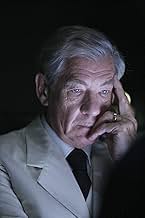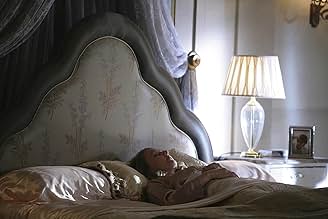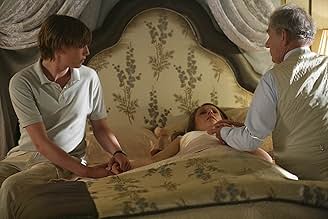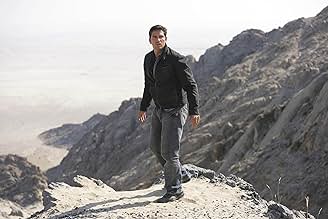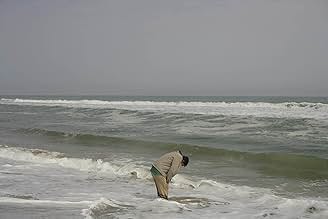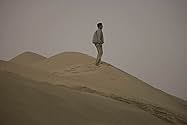The Prisoner
- Mini serie TV
- 2009
- 45min
VALUTAZIONE IMDb
6,1/10
8154
LA TUA VALUTAZIONE
Un agente governativo viene rapito e si ritrova in un'isola misteriosa chiamata "Il Villaggio", dove gli abitanti sono identificati solo da numeri e nessuno può fuggire.Un agente governativo viene rapito e si ritrova in un'isola misteriosa chiamata "Il Villaggio", dove gli abitanti sono identificati solo da numeri e nessuno può fuggire.Un agente governativo viene rapito e si ritrova in un'isola misteriosa chiamata "Il Villaggio", dove gli abitanti sono identificati solo da numeri e nessuno può fuggire.
- Candidato a 2 Primetime Emmy
- 10 candidature totali
Sfoglia gli episodi
Recensioni in evidenza
As a fan of the original Prisoner I can't begin to say how incredibly disappointed I am with this "remake". The "plot" is non-existent and makes no sense. It might be good if it had characters that made kept your interest in spite of the unintelligible plot line but sadly there isn't a single character that makes me care about what happens to them. In the original Patrick McGoohan was an excellent actor and portrayed an engaging character. The character of 6 in the original embodied the admirable quality of not giving up in spite of the odds. He was direct, smart and capable. In contrast, this 6 is a confused mamby-pamby guy with the personality of a doorstop. I am especially disappointed that one of my favorite actors, Ian McKellen would agree to appear in this mess. I think Patrick McGoohan is turning over in his grave.
A man resigns from a mysterious agency. Soon, he finds himself in a place known only as "the Village" where nobody has a name but is a number where he's re-dubbed Six by its leader a man known only as Two. Resisting Two's attempts to break his mind with his insistence "I am not a number, I am a free man," Six begins trying to escape while trying to piece together what and where the Village really is. That, in short, is the premise of the six episode miniseries re-imaging of the classic 1967 Patrick McGoohan TV series The Prisoner. The Prisoner is an intriguing psychological thriller with sci-fi overtones.
The miniseries is anchored by a fine cast. Jim Caviezal plays Six, a man lost in a strange world and always on his guard against everyone and everything around him, who is a radically different character from the McGoohan version. His foe is Sir Ian McKellen as Two, the Big Brother like leader who seems benevolent yet is in fact a manipulative and cunning man who brings to mind memories of Leo Mckern in the original series. The villagers include Two's son 11-12 (Jamie Campbell Bower), the beautiful but mysterious doctor 313 (Ruth Wilson) and 4-15 (Hayley Atwell) who has some connection to Six's old life. Together they bring to life the assorted characters who occupy the Village.
By definition, this is a re-imaging of the original series. The biggest change being the focus is on the mind games between Six and Two, making this more of a psychological thriller then the original perhaps was. These include introducing the concept of the Village being the only thing in existence which does stretch creditability quite a bit. More successful are mind games such as in Harmony when Six is told he has brother for example. More successful perhaps is the setting for these mind games is an intriguing new version of the Village set in the middle of the desert. Like in the original, it is here that the sci-fi overtones to come in. With them the series explores issues such as electronic surveillance, mind control and the ability of an individual to resist conforming with society allowing for some intriguing social commentary along the way. Also intriguing is the clever playing with flashbacks to Six's previous life which are not be what they seem. Having said all that, things can be a bit too surreal and downright confusing at times so if you don't have a open mind and don't pick up clues as the miniseries goes on, things can (and will) be baffling. Overall, the re-imaging works splendidly.
There's homages to the original series as well. These include such things as the old man's costume at the beginning of episode one (the role was originally meant as a cameo for the late Patrick McGoohan) and the return of the mysterious balloon like guard Rover. Perhaps the biggest homage lie in the various episode titles which are all derived from original series including Arrival and Checkmate to name just two. This helps to remind the audience that, though this is at times a radical re-imagining of the series, the past hasn't been completely forgotten about.
By blending fine acting, mind games, an intriguing setting, homages to the original series, and clever playing with story-lines and ideas this version of The Prisoner becomes, while not a classic, an intriguing psychological thriller with sci-fi overtones. Are you interested? Then prepare to take a classic TV series in an intriguing new direction. But remember: "You only think you're free."
The miniseries is anchored by a fine cast. Jim Caviezal plays Six, a man lost in a strange world and always on his guard against everyone and everything around him, who is a radically different character from the McGoohan version. His foe is Sir Ian McKellen as Two, the Big Brother like leader who seems benevolent yet is in fact a manipulative and cunning man who brings to mind memories of Leo Mckern in the original series. The villagers include Two's son 11-12 (Jamie Campbell Bower), the beautiful but mysterious doctor 313 (Ruth Wilson) and 4-15 (Hayley Atwell) who has some connection to Six's old life. Together they bring to life the assorted characters who occupy the Village.
By definition, this is a re-imaging of the original series. The biggest change being the focus is on the mind games between Six and Two, making this more of a psychological thriller then the original perhaps was. These include introducing the concept of the Village being the only thing in existence which does stretch creditability quite a bit. More successful are mind games such as in Harmony when Six is told he has brother for example. More successful perhaps is the setting for these mind games is an intriguing new version of the Village set in the middle of the desert. Like in the original, it is here that the sci-fi overtones to come in. With them the series explores issues such as electronic surveillance, mind control and the ability of an individual to resist conforming with society allowing for some intriguing social commentary along the way. Also intriguing is the clever playing with flashbacks to Six's previous life which are not be what they seem. Having said all that, things can be a bit too surreal and downright confusing at times so if you don't have a open mind and don't pick up clues as the miniseries goes on, things can (and will) be baffling. Overall, the re-imaging works splendidly.
There's homages to the original series as well. These include such things as the old man's costume at the beginning of episode one (the role was originally meant as a cameo for the late Patrick McGoohan) and the return of the mysterious balloon like guard Rover. Perhaps the biggest homage lie in the various episode titles which are all derived from original series including Arrival and Checkmate to name just two. This helps to remind the audience that, though this is at times a radical re-imagining of the series, the past hasn't been completely forgotten about.
By blending fine acting, mind games, an intriguing setting, homages to the original series, and clever playing with story-lines and ideas this version of The Prisoner becomes, while not a classic, an intriguing psychological thriller with sci-fi overtones. Are you interested? Then prepare to take a classic TV series in an intriguing new direction. But remember: "You only think you're free."
Movie kept my interest. It separates from the original series in numerous ways. I would have preferred a closer match. That said, I thought the approach to this was still OK, and kudos to the actors who did a very nice job.
However, this remake failed with the ending of the movie. I won't spoil it. I believe the audience is left with just not believing the main character would act that way -- based on the story's own construction of the character. A story can take any twist, which is is fine, but if it makes a character act "out of character" one loses faith in the story. In this case, there is no justification for the ending based on what was seen. Unfortunate writing at the end.
However, this remake failed with the ending of the movie. I won't spoil it. I believe the audience is left with just not believing the main character would act that way -- based on the story's own construction of the character. A story can take any twist, which is is fine, but if it makes a character act "out of character" one loses faith in the story. In this case, there is no justification for the ending based on what was seen. Unfortunate writing at the end.
Would anyone really want to see a verbatim remake of a 1960s TV series? C'mon people, spies? It's not the cold war. Let the new series explore themes of paranoia, subversion, and identity in a new, interesting, and CURRENT context. At the same time it's adding new mystery. Part of the fun is figuring out what's going on. I wouldn't want a replica mystery and therefore be spoiled. I applaud the update, its creepy, technically sound, and confusing as hell. Granted, the acting is not top notch, Caviezel is doing the best he can but can't carry it, although McKellen and Ruth Wilson are great. Is it perfect? No. But does it deserve 1-2/10 just because it doesn't mimic its predecesor? C'mon people stop living in the past.
1967's Cold War and its counter culture are gone; they've been replaced by 2009's global village and its consumer culture. So 2009's Prisoner is no longer an angry young man fighting for his identity against secret government policies and flagrant brainwashing, he's an angst-ridden 30-something trying to hang on to his identity in the face of overwhelming marketing and soothing pharmaceuticals.
2009's The Prisoner takes all the familiar elements of 1967's cult classic and re-interprets them in a relevant way, just like good remakes are supposed to. The psychedelic, lava-lamp surrealism of the sixties may be gone, but, don't worry, they've been replaced by the post-modern, dream-like surrealism of the oughts.
Yes, the Village still needs to assimilate No. 6, but it no longer cares why he would wish to resign from its society, it only wants him to understand that he can't. Instead of foiling No. 6's repeated escape attempts from the superficially charming, but inherently oppressive, Village, this new Village, still just as pleasant-looking, and oppressive, just makes it clear that there is no place else to escape to. The consumer culture and its global village are everywhere now. There is no escape.
So, instead of a government desperately trying Pavlovian conditioning, hypnotic suggestion, and hallucinogens in the water, a corporation tries matching people with their perfect mates, giving them mind-numbing jobs to take their minds off their melancholy, distracting them with melodramatic soap operas, and, maybe, making them feel a little better with some gene-therapy.
Sure, everyone's still under surveillance in this Village, but this time, its not the Village government trying to identify revolutionaries so it can silence them, its the Summakor corporation trying to identify dreamers so it can subject them to a concentrated dose of consumer culture. And if that doesn't work, maybe a few pharmaceuticals and a promotion will co-opt the more troublesome ones.
2009's The Prisoner takes all the familiar elements of 1967's cult classic and re-interprets them in a relevant way, just like good remakes are supposed to. The psychedelic, lava-lamp surrealism of the sixties may be gone, but, don't worry, they've been replaced by the post-modern, dream-like surrealism of the oughts.
Yes, the Village still needs to assimilate No. 6, but it no longer cares why he would wish to resign from its society, it only wants him to understand that he can't. Instead of foiling No. 6's repeated escape attempts from the superficially charming, but inherently oppressive, Village, this new Village, still just as pleasant-looking, and oppressive, just makes it clear that there is no place else to escape to. The consumer culture and its global village are everywhere now. There is no escape.
So, instead of a government desperately trying Pavlovian conditioning, hypnotic suggestion, and hallucinogens in the water, a corporation tries matching people with their perfect mates, giving them mind-numbing jobs to take their minds off their melancholy, distracting them with melodramatic soap operas, and, maybe, making them feel a little better with some gene-therapy.
Sure, everyone's still under surveillance in this Village, but this time, its not the Village government trying to identify revolutionaries so it can silence them, its the Summakor corporation trying to identify dreamers so it can subject them to a concentrated dose of consumer culture. And if that doesn't work, maybe a few pharmaceuticals and a promotion will co-opt the more troublesome ones.
Lo sapevi?
- Quiz"Be seeing you" is a commonly-heard phrase in Il prigioniero (1967), this movie, and was also one of Patrick McGoohan's catchphrases in Danger Man (1960) and Gioco pericoloso (1964) . McGoohan's character "Johnny Cousin" (a pot-smoking drummer) in All Night Long (1962) uses the phrase also when he says goodbye to the road manager "Berger" towards the end of the movie.
- ConnessioniFeatured in A Six Hour Film Shot in 92 Days: The Diary of 'The Prisoner' (2010)
I più visti
Accedi per valutare e creare un elenco di titoli salvati per ottenere consigli personalizzati
- How many seasons does The Prisoner have?Powered by Alexa
Dettagli
- Tempo di esecuzione
- 45min
- Colore
- Proporzioni
- 1.78 : 1
Contribuisci a questa pagina
Suggerisci una modifica o aggiungi i contenuti mancanti



